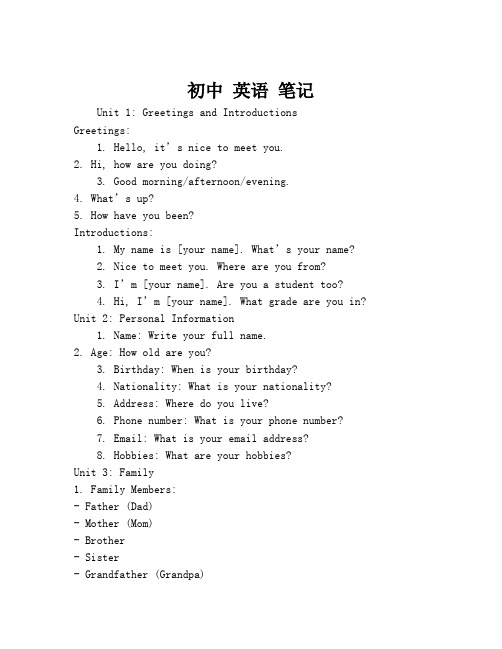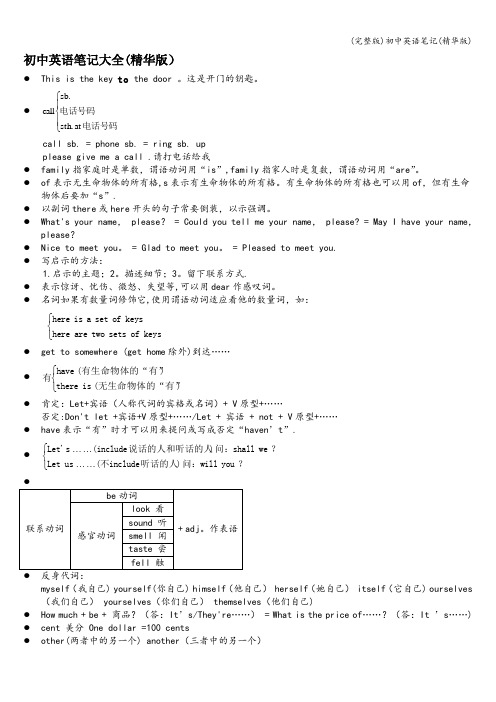初中英语笔记大全
初英语知识点笔记整理

初英语知识点笔记整理初一英语知识点笔记整理一、词汇(一)名词1、名词的分类普通名词:如 book(书)、desk(桌子)、student(学生)等。
专有名词:如China(中国)、Beijing(北京)、Tom(汤姆)等。
2、名词的数可数名词:有单数和复数形式。
规则变化:一般在词尾加 s ,如 book books ;以 s 、x 、ch 、sh结尾的加 es ,如 bus buses ;以辅音字母+ y 结尾的,变 y 为 i 再加es ,如 city cities ;以 f 或 fe 结尾的,变 f 或 fe 为 v 再加 es ,如 knife knives 。
不规则变化:如 man men 、woman women 、child children 、foot feet 、tooth teeth 等。
不可数名词:没有复数形式,如 water(水)、milk(牛奶)、bread(面包)等。
(二)动词1、动词的种类实义动词:表示具体的动作,如 run(跑)、eat(吃)、study(学习)等。
系动词:如 be (am 、is 、are )、look(看起来)、sound(听起来)等。
助动词:如 do 、does 、did 等,用于构成疑问句和否定句。
情态动词:如 can (能、会)、may (可以)、must (必须)等。
2、动词的时态一般现在时:表示经常发生的动作或存在的状态。
主语是第三人称单数时,动词要用第三人称单数形式。
现在进行时:表示正在进行的动作,结构为“be +动词的现在分词”。
一般过去时:表示过去发生的动作,动词要用过去式。
(三)形容词和副词1、形容词:用于修饰名词,如 beautiful (美丽的)、big (大的)、good (好的)等。
2、副词:用于修饰动词、形容词或其他副词,如 quickly (快地)、very (非常)、carefully (仔细地)等。
3、形容词和副词的比较级和最高级规则变化:一般在词尾加 er 、est ,如 tall taller tallest ;以 e 结尾的加 r 、st ,如 nice nicer nicest ;重读闭音节词,双写末尾辅音字母再加 er 、est ,如 hot hotter hottest ;多音节词和部分双音节词,在前面加 more 、most ,如 interesting more interesting most interesting 。
初三英语笔记完整版

初三英语笔记完整版一、词汇篇1. 名词(1)可数名词:表示可以一个一个数清楚的名词,如:book、pen、student等。
(2)不可数名词:表示无法一个一个数清楚的名词,如:water、air、news等。
(3)名词复数:大部分名词在词尾加s或es变为复数形式,如:books、pens、students等。
2. 动词(1)动词时态:表示动作发生的时间,如:一般现在时、一般过去时、一般将来时等。
(2)动词短语:由动词和其他词组合而成的固定搭配,如:look after、take care of、get up等。
3. 形容词(1)形容词比较级:表示两者之间的比较,如:taller、thinner、richer等。
4. 副词(1)时间副词:表示动作发生的时间,如:now、then、always 等。
(2)地点副词:表示动作发生的地点,如:here、there、everywhere等。
5. 介词(1)表示时间:at、on、in等。
(2)表示地点:in、on、under等。
(3)表示方向:to、from、into等。
二、句型篇1. 简单句(1)陈述句:表示陈述事实,如:I like English.(2)疑问句:表示提问,如:Do you like English?(3)感叹句:表示强烈的感情,如:What a beautiful day it is!2. 并列句(1)并列连词:and、but、or等。
(2)并列句结构:两个简单句通过并列连词连接而成,如:I like English, but I don't like math.3. 复合句(1)主从句:由主句和从句构成,如:If it rains, we will stay at home.(2)从句引导词:that、who、which等。
三、语法篇1. 动词时态(1)一般现在时:表示经常发生的动作或状态,如:I go to school every day.(2)一般过去时:表示过去发生的动作或状态,如:I went to the park yesterday.(3)一般将来时:表示将来发生的动作或状态,如:I will go to Beijing next month.2. 句子结构(1)主谓宾结构:如:I love you.(2)主谓表结构:如:The flower is beautiful.(3)主谓双宾结构:如:My mother bought me a new book.3. 名词性从句(1)主语从句:如:What he said is right.(3)表语从句:如:The problem is who can help us.四、阅读理解篇1. 阅读技巧(1)快速浏览:先快速阅读全文,了解文章大意。
初中英语语法知识大全笔记

初中英语语法知识大全笔记初中英语语法知识是学习英语的基础,它涵盖了词汇、句子结构、时态、语态、语气、从句等多个方面。
以下是初中英语语法知识的大全笔记:一、词汇。
1. 名词,包括可数名词和不可数名词,可数名词有单数和复数形式,不可数名词通常表示抽象概念或无法分割的物质。
2. 代词,包括人称代词、物主代词、反身代词、指示代词、疑问代词和不定代词。
3. 动词,包括情态动词、一般现在时、一般过去时、现在进行时、过去进行时、一般将来时等时态和语态的变化规则。
4. 形容词和副词,形容词用来修饰名词,副词用来修饰动词、形容词或其他副词。
5. 介词,用来表示位置、方向、时间、原因、目的等关系。
6. 连词,包括并列连词、从属连词和关系代词。
二、句子结构。
1. 主谓宾结构,句子的基本结构,主语+谓语+宾语。
2. 主谓补结构,谓语动词后接表语或宾补,用来补充说明主语或宾语。
3. 主谓双宾结构,谓语动词后接两个宾语,分别表示人和物。
4. 主系表结构,谓语动词为系动词,后接表语。
5. 复合句,包括并列句、主从复合句和状语从句等多种类型。
三、时态。
1. 一般现在时,表示经常性或习惯性的动作或状态。
2. 一般过去时,表示过去某个时间发生的动作或状态。
3. 一般将来时,表示将来某个时间将要发生的动作或状态。
4. 现在进行时,表示现在正在进行的动作。
5. 过去进行时,表示过去某一时刻正在进行的动作。
6. 现在完成时,表示过去某个时间开始,一直持续到现在的动作或状态。
四、语态。
1. 主动语态,表示主语是动作的执行者。
2. 被动语态,表示主语是动作的承受者。
五、语气。
1. 陈述句,陈述一个事实或看法。
2. 祈使句,表示请求、命令、建议等。
3. 疑问句,用来询问信息或确认事实。
六、从句。
1. 定语从句,用来修饰名词或代词。
2. 状语从句,用来修饰动词、形容词或副词。
3. 名词性从句,在句子中充当名词的成分。
以上就是初中英语语法知识的大全笔记,希望对你的学习有所帮助。
初中英语笔记大全(精华版)

be famous for…… 因……出名
忙于 某事
be busy doing sth. be busy with sth.
对某人某事 严格
be strict with sb. be strict in sth. / doing sth.
for + 时间段……做某事持续多久 问:How long do you have volleyball? 答:I have volleyball for two hours. ask sb. some questions. 问某人一些问题 ask sb. to do sth. 叫某人做某事 no =not any because 不和 so 同时使用,although(尽管)不和 but 同时使用。
Thanks. / Thank you. / Thank you very much. / Thank a lot. / Many thanks.
You are welcome. / That’s OK. / That’s all right. It’s my pleasure. / With pleasure. (这是我的荣幸。) make friend with sb. (和……交朋友) Thanks for + n. / v.ing = Thanks sb. for + n. / v.ing below 在……下方(非正下方) 反义词:above 在……上面(非正上方,没有接触面) under 在……下面(正下方) 反义词:on(有接触面),over(没有接触面)在……上面(正上方) keep + sth. + adj. 使某物保持某状态。 keep + adj. 保持某状态。 表示请求、建议、希望得到对方肯定回答的疑问句用“some”。 问:Let…… 答:OK. / All right. / That’s a good idea. / That sounds good. / Sorry. sport 用来修饰名词要变为 sports。 play + the + 乐器 Erhu 除外 be 动词后叫表语,修饰名词叫定语,修饰动词叫状语,前后两词对等叫同位语。 人民币和日元变复数不变,其他要。 be good with sb. = get on well with sb. 与某人相处的很好 问:How often does Rick run on weekend? 答:Rick usually runs on weekend.
初中英语知识点总结笔记图片

初中英语知识点总结笔记图片一、词汇与短语1. 基础词汇- 常见名词:家庭、学校、食物、动物、职业等。
- 常见动词:be, have, do, go, make, take, come, see, get, give, play, learn等。
- 常见形容词:big, small, happy, sad, new, old, good, bad, easy, difficult等。
- 常见副词:very, quite, really, often, usually, sometimes, never等。
2. 短语搭配- 动词短语:look at, listen to, talk to, wait for, think about, play with等。
- 介词短语:in the morning, on the weekend, at school,with friends, by the way等。
- 常用表达:How are you? I’m fine, thanks. What’s your name? My name is... Nice to meet you. See you later.等。
二、语法知识1. 时态- 一般现在时:表示经常发生的动作或状态。
- 一般过去时:表示过去发生的动作或状态。
- 一般将来时:表示将来发生的动作或状态。
2. 句型结构- 肯定句:I am a student.- 否定句:I am not a student.- 疑问句:Are you a student?- 特殊疑问句:What are you? (错误) / Who are you?3. 代词- 人称代词:I, you, he, she, it, we, they.- 物主代词:my, your, his, her, its, our, their.- 反身代词:myself, yourself, himself, herself, itself, ourselves, yourselves, themselves.4. 冠词- 不定冠词:a, an (用于单数可数名词前)。
初中 英语 笔记

初中英语笔记Unit 1: Greetings and Introductions Greetings:1. Hello, it’s nice to meet you.2. Hi, how are you doing?3. Good morning/afternoon/evening.4. What’s up?5. How have you been?Introductions:1. My name is [your name]. What’s your name?2. Nice to meet you. Where are you from?3. I’m [your name]. Are you a student too?4. Hi, I’m [your name]. What grade are you in? Unit 2: Personal Information1. Name: Write your full name.2. Age: How old are you?3. Birthday: When is your birthday?4. Nationality: What is your nationality?5. Address: Where do you live?6. Phone number: What is your phone number?7. Email: What is your email address?8. Hobbies: What are your hobbies?Unit 3: Family1. Family Members:- Father (Dad)- Mother (Mom)- Brother- Sister- Grandfather (Grandpa)- Grandmother (Grandma)- Uncle- Cousin2. Describing Family Members:- My father is tall and has black hair.- My sister is younger than me.- My aunt is a teacher.Unit 4: School Life1. Subjects:- English- Science- History- Geography- Physical Education (PE)- Music2. Daily Routine:- Wake up in the morning- Brush teeth- Eat breakfast- Go to school- Attend classes- Have lunch- Participate in extracurricular activities - Study at home- Do homework- Eat dinner- Relax and rest- Go to bedUnit 5: Hobbies and Interests1. Hobbies:- Reading books- Playing sports- Watching movies- Listening to music- Drawing and painting- Playing musical instruments2. Interests:- Traveling and exploring new places- Learning about different cultures- Trying new food- Meeting new people- Playing video gamesRemember to review the vocabulary and grammar learned in each unit. Practicing and using the language regularly will help improve your English skills. Good luck!。
(完整版)初中英语笔记(精华版)

初中英语笔记大全(精华版)● This is the key to the door 。
这是开门的钥匙。
● ⎪⎩⎪⎨⎧电话号码电话号码at .sth .sb call call sb. = phone sb. = ring sb. upplease give me a call .请打电话给我● family 指家庭时是单数,谓语动词用“is ”,family 指家人时是复数,谓语动词用“are ”。
● of 表示无生命物体的所有格,s 表示有生命物体的所有格。
有生命物体的所有格也可以用of ,但有生命物体后要加“s ”.● 以副词there 或here 开头的句子常要倒装,以示强调。
● What's your name , please ? = Could you tell me your name , please? = May I have your name , please ?● Nice to meet you 。
= Glad to meet you 。
= Pleased to meet you.● 写启示的方法:1.启示的主题;2。
描述细节;3。
留下联系方式.● 表示惊讶、忧伤、微怒、失望等,可以用dear 作感叹词。
●名词如果有数量词修饰它,使用谓语动词适应看他的数量词,如: ⎩⎨⎧keys of sets two are here keys of set a is here● get to somewhere (get home 除外)到达……● ⎩⎨⎧)无生命物体的“有”(is there )有生命物体的“有”( have 有 ● 肯定:Let+宾语(人称代词的宾格或名词)+ V 原型+……否定:Don't let +宾语+V 原型+……/Let + 宾语 + not + V 原型+……● have 表示“有”时才可以用来提问或写成否定“haven’t”.● ⎩⎨⎧⋯⋯⋯⋯? you will 问: )听话的人include 不(us Let ? we shall 问: )说话的人和听话的人(include s Let'●myself (我自己) yourself(你自己) himself (他自己) herself (她自己) itself (它自己) ourselves (我们自己) yourselves (你们自己) themselves (他们自己)● How much + be + 商品?(答:It’s/They're……) = What is the price of ……?(答:It ’s ……) ● cent 美分 One dollar =100 cents● other(两者中的另一个) another (三者中的另一个)●越接近物品本身性质的形容词越靠近物品,如:big blue hat●帮助某人做某事help sb。
(完整版)初中英语总复习+笔记大全

初三英语总复习笔记七年级(上)Unit 1 复习要点短语和句子1、Good morning/ Good afternoon / evening 。
早上/下午/晚上好2、(It’s) Nice to meet/see you。
= (It’s)Good to meet/see you.= (I'm) Glad to meet/see you= (I’m) Pleased to meet/see you= (I'm) Happy to meet/see you. 很高兴见到你3、Welcome to China 欢迎到中国来.4、Thanks /Thank you . 谢谢5、You’re welcome 。
/ That’s all right (OK) .不用谢,6、Stand up . 起立 Sit down .坐下7、This is…。
.介绍第三者的用语,复数用These are…8、How do you do ? 您好 9、 How are you ? 您好吗? How is she\he? 她\他好吗?10、I’m fine 。
我很好。
11、What’s your/his /her name ?= May I know/have your/his /her name?Could you please tell me your/his /her name?你/他/她叫什么名字?12、My name is Jane 。
我名叫简13、Where are you from ? = Where do you come from? Where is he/she from?= Where does he/she come from?你/他/她/他们来自哪里?14、I am / He (She) is /They are from Canada/Japan/the U.S。
A/England/Cuba/China。
- 1、下载文档前请自行甄别文档内容的完整性,平台不提供额外的编辑、内容补充、找答案等附加服务。
- 2、"仅部分预览"的文档,不可在线预览部分如存在完整性等问题,可反馈申请退款(可完整预览的文档不适用该条件!)。
- 3、如文档侵犯您的权益,请联系客服反馈,我们会尽快为您处理(人工客服工作时间:9:00-18:30)。
初中英语笔记大全This is the key to the door .这是开门的钥匙.●⎪⎩⎪⎨⎧电话号码电话号码at .sth .sb call call sb.=phone sb.=ring sb.upplease give me a call .请打电话给我●family 指家庭时是单数,谓语动词用“is”,family 指家人时是复数,谓语动词用“are”.●of 表示无生命物体的所有格,s 表示有生命物体的所有格.有生命物体的所有格也可以用of,但有生命物体后要加“s”.●以副词there 或here 开头的句子常要倒装,以示强调.●What’s your name,please?=Could you tell me your name,please?=May I have your name,please?●Nice to meet you.=Glad to meet you.=Pleased to meet you.●写启示的方法:1.启示的主题;2.描述细节;3.留下联系方式.●表示惊讶、忧伤、微怒、失望等,可以用dear 作感叹词.●名词如果有数量词修饰它,使用谓语动词适应看他的数量词,如:⎩⎨⎧keys of sets two are here keys of set a is here ●get to somewhere (get home 除外)到达……●⎩⎨⎧)无生命物体的“有”( is there )有生命物体的“有”( have 有●肯定:Let+宾语(人称代词的宾格或名词)+V 原型+……否定:Don’t let +宾语+V 原型+……/Let +宾语+not +V 原型+……●have 表示“有”时才可以用来提问或写成否定“haven’t”.●⎩⎨⎧⋯⋯⋯⋯? you will 问: )听话的人include 不(us Let ? we shall 问: )说话的人和听话的人(include s Let'联系动词be 动词+adj.作表语感官动词look 看sound 听smell 闻taste 尝fell 触●反身代词:myself(我自己)yourself(你自己)himself(他自己)herself (她自己)itself(它自己)ourselves(我们自己)yourselves(你们自己)themselves(他们自己)●How much+be+商品?(答:It’s/They’re……)=What is the price of……?(答:It’s……)●cent美分One dollar=100cents●other(两者中的另一个)another(三者中的另一个)●越接近物品本身性质的形容词越靠近物品,如:big blue hat●帮助某人做某事help sb.(to)do sth.help sb.with sth.with the help(n.)of sb.e.g.He studies math well,with the help of teacher.●一般将来时的一般形式:主语+will+动词原形+……●Can I help you?=What can I do for you?=(Is there)anythingI can do for you?welcomea.受欢迎的v.欢迎n.欢迎get a warm welcome得到热烈欢迎●be动词不加动词原形●“hundred,thousand”与基数词一起表示具体数字时不加“s”.hundreds of上百thousands of上千●buy sth.for sb.=buy sb.(间接宾语)sth.(直接宾语)为某人买某物●any body在肯定句中表示任何人,在否定句和疑问句中不是.●for表示动词的对象或接受者,表示用途,表示目的,表示等价交换或标注价格,表示时间持续多久,表示距离,表示理由或原因.each强调两者或两者以上的每一个,强调个体+第三人称单数every强调三者或三者以上的每一个,强调整体There are many trees on each side of the roadThere are many trees on both sides of the road●the price is low(high)价格低(高)也also放在be动词、情态动词、助动词之后,实意动词之前either放在句末(疑问句、否定句)too放在句末(肯定句)●on a cold morning在一个寒冷的早晨when……?答不用具体时间what time……?答要用具体时间比赛contest和智力或知识有关的竞赛gamematch有计划预先安排好的比赛●持续一段时间的节日一般用“festival”.a kind of一种many kind of许多种all kinds of各种各样●kind of……有几分……如:The elephants are kind of cute.●含有think的宾语从句中如果从句中有否定,要否定前移,如:She doesn’t think they are boring.(她认为他们不无聊)●问:How are you?答:I’m fine.(我很好.)/Just so so.(一般般.)●表示时间、价格、距离的名词作主语,谓语动词用单数.如:Two dollars is enough(足够).●怎么判断双音节单词中第一个音节是开音节还是闭音节:双音节单词中的两个元音是两个音节的中心,元音是由元音字母或元音字母组合发出的音,因此,首先找到单词中的两个元音字母或元音字母组合,两个中心就清楚了.两个中心之间的辅音字母(不是字母组合)则分别划归两个音节,第一个音节即为闭音节,如果两个中心之间的辅音字母为双写字母(包括“r”),分别划归前后,第一个音节按闭音节读音.如:paper/’peipə/(pa为开音节)member/’membə/(mem为闭音节)happy /’hæpi/(hap为闭音节)sorry/’sɔri/(sor为闭音节)certainly/’sə:tnil/●I am sorry.I can’t go with you.(对不起.我不能和你一起去.)●Thanks./Thank you./Thank you very much./Thank a lot./ Many thanks.●You are welcome./That’s OK./That’s all right.●It’s my pleasure./With pleasure.(这是我的荣幸.)●make friend with sb.(和……交朋友)●Thanks for+n./v.ing=Thanks sb.for+n./v.ing●below在……下方(非正下方)反义词:above在……上面(非正上方,没有接触面)under在……下面(正下方)反义词:on(有接触面),over(没有接触面)在……上面(正上方)●keep+sth.+adj.使某物保持某状态.keep+adj.保持某状态.●表示请求、建议、希望得到对方肯定回答的疑问句用“some”.●问:Let……答:OK./All right./That’s a good idea./That sounds good. /Sorry.●sport用来修饰名词要变为sports.●play+the+乐器Erhu除外●be动词后叫表语,修饰名词叫定语,修饰动词叫状语,前后两词对等叫同位语.●人民币和日元变复数不变,其他要.●be good with sb.=get on well with sb.与某人相处的很好●问:How often does Rick run on weekend?答:Rick usually runs on weekend.●always(总是) usually(通常) often(经常) sometime(有时) seldom(很少) never(从不)●频度副词放在be动词或助动词之后,实意动词或行为动词之前.●感叹句:What+(a/an)+adj.+n.+(主)+(谓)!如:What beautiful flowers they are!How+adj./adv.+(主)+(谓)!如:How beautiful the flowers are!●Can you think what his job is?含有宾语从句的复合句,宾语从句的从句必须是陈述句.●Start to do sth.开始做某事●be famous for……因……出名忙于某事be busy doing sth. be busy with sth.对某人某事严格be strict with sb.be strict in sth./doing sth.●for+时间段……做某事持续多久●问:How long do you have volleyball?答:I have volleyball for two hours.●ask sb.some questions.问某人一些问题ask sb.to do sth.叫某人做某事●no=not any●because不和so同时使用,although(尽管)不和but同时使用.little修饰不可数名词几乎没有(否定)a little有一些(肯定)few修饰可数名词几乎没有(否定)a few有一些(肯定)●either:两者中的任何一个都行.neither:两者中的任何一个都不.●用“may”提问的句子回答用can/can‘t或must/mustn’t;用“can”提问的句子回答用can/can’t;用“must”提问的句子回答用need/needn’t.如:1.May I park my car here?Yes,you can/must./No,you can’t/mustn’t.2.Can I watch TV?Yes,you can./No,you can’t.3.Must I clean the classroom this morning?Yes,you need./No,you needn’t.●be afraid of doing sth./be afraid of sth.害怕做某事/某物●be fond of =like●make a continuation to sth.对……有贡献●do well in =be good at 擅长……●比较级+and +比较级越来越……●give back =return 归还●法国人单数:Frenchman/Frenchwoman英国人单数:Englishman/EnglishwomanChinese 和Japanese 单复数同形●in the world 在世界上all over the world /around the world /the whole word 全世界●in the school 在学校里in school 在学校学习●outside 在……外面outside the gate to the park 在公园门外●turning 转角●go down +……沿着……路走go straight down +……沿着……路直走●enjoy doing sth.喜欢做某事enjoy oneself =have a good time =have fun●take a walk =go for a walk =have a walk●the beginning of ……的开始at the beginning of 强调在……开始的那一刻in the beginning 起初,一开始from the beginning 开始时from beginning to end 从开始到结束●visit +地点、参观某地a visit to +地点、参观某地●have fun doing sth.做……很开心●地点+is a great place to do sth.……是一个做……的地方●be busy with sth.忙于某事●the way to ……去……的路on the way to +地点在去……的路上on one’s way to +地点某人在去……的路上on my way to home 在我回家的路上●把某物递给某人sth. sb. pass sb. to sth. pass ⎭⎬⎫●⎩⎨⎧++++小地方at 大地方in arrive ●⎪⎩⎪⎨⎧school reach schoolto get school at arrive 到达学校●主语+hope(that)+从句主语+hope +to do sth.●live on ……靠……为生●{{{⎪⎪⎪⎩⎪⎪⎪⎨⎧++⎩⎨⎧++主语为人主语为物(强调金钱)时间、金钱主语为人时间、金钱做某事要花某人多少时间、金钱主语为物花费pay yuan.3 me costs book This cost sth. doing sth./(in)on spend spend sth. do .to sb. It takes take pay 金钱to sb.for sth.为了某物付钱给某人pay 金钱to sb.=pay sb.金钱pay sb.付钱给某人●between 两者之间among 三者或三者以上之间●⎪⎩⎪⎨⎧触面指从上空穿过、没有接指从内部穿过面指在表面穿过、有接触over through across ●Why not do sth.?表建议:为什么不做……呢?Why don’t you do sth.?表疑问:你为什么不要……?●⎩⎨⎧++代词名词短语名词句子//because because ⎩⎨⎧illness.the of because school to go t didn' I ill. was I because school to go t didn' I ,,如●.n of kinds all of kinds many of kind a adj. of kind +⎪⎪⎭⎪⎪⎬⎫+如:People like this kind of animals,because they’re kind of cute.●in the south of 在……南部●asleep 睡着的adj.fall asleep 入睡be asleep 正睡着●be friendly to sb.对某人友好●don’t forget to do sth.不要忘记做某事●tell sb.to do sth.叫某人去做某事tell sb.not to do sth.叫某人不去做某事●⎩⎨⎧停下正在做的是事停下正在做的,去做某 sth. doing stop sth. do to stop ●介词+doing sth.●would like to do sth.想要做某事●Which place do you live in =Where do you live ?●Isn’t he cute ?否定疑问句●Sam wants to play basketball,doesn’t he ?翻译疑问句●Why not do sth.?=Why don’t you do sth.?●practice doing sth.练习做某事●use sth.to do sth.●比较级中的代词用that ,如:The map of Beijing is better than that of Tianjin.●said to oneself 自言自语●be careful not to do sth.小心别做某事●do one’s best 尽某人的全力●⎩⎨⎧⋯⋯看不出原材料的看得出原材料的制作的由 from make be of made be ●be satisfied with……对……满意●be full of 满是……●⎩⎨⎧在外部的前面在内部的前面 of front in of front in the ●条件状语从句:主语为将来时,从句为一般现在时.如:We’ll have a sports meeting if it doesn’t rain tomorrow.●It’s (形式主语)+adj.+(for sb.)+to do sth.(主语)做某事怎么样.如:It’s important for him to play the piano .弹钢琴对他很重要.It’s +adj.+of sb.to do sth.(adj.应为sb.的本身性质)如:It’s kind of you to help me.你帮助了我,你真好.●go across the bridge 过桥●in +时间段(将来时)多久后●⎩⎨⎧⋯⋯(放在时间后)(放在时间前)之后,多久之后在laterafter ●What does she do ?=What’s she?=What’s her job?●⎩⎨⎧(CN)job UN)work (●⎪⎪⎩⎪⎪⎨⎧一些时间几次间某时,某个不确定的时频度副词;有时 time some times some sometime sometimes 如:I hope I can visit HongKong sometime.●从某人那里得到某物间接宾语)直接宾语,给某人某物(.sb from .sth get .sb .sth sb. to .sth give .sth .sb give ⎭⎬⎫⎩⎨⎧●⎩⎨⎧穿上穿的状态on put wear ●talk to /with sb.与某人交谈●⎩⎨⎧脱离危险处于危险中danger of out be danger in be ●be out 外出●⎩⎨⎧叫某人做某事问某人某事sth. do to .sb ask .sth .sb ask ●waitress 女服务员●⎩⎨⎧sth.work with sb.work with 工作与某物有关与某人工作●be late for……做……迟到了●花需要被浇水。
